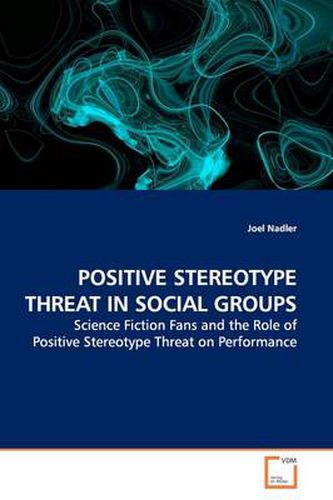Readings Newsletter
Become a Readings Member to make your shopping experience even easier.
Sign in or sign up for free!
You’re not far away from qualifying for FREE standard shipping within Australia
You’ve qualified for FREE standard shipping within Australia
The cart is loading…






This title is printed to order. This book may have been self-published. If so, we cannot guarantee the quality of the content. In the main most books will have gone through the editing process however some may not. We therefore suggest that you be aware of this before ordering this book. If in doubt check either the author or publisher’s details as we are unable to accept any returns unless they are faulty. Please contact us if you have any questions.
This work examined stereotype threat within social groups and whether stereotype threat would be seen with a positive stereotype. Stereotype threat is usually seen as a decrease in performance induced by an anxiety within individuals fearing they will confirm a pre-existing and culturally-known negative stereotype. Science fiction fans were compared to a matched sample of college students. Both groups were given a 50-item problem-solving task described as an intelligence test. Individuals were randomly assigned to one of three conditions (1) no threat condition, (2) general threat condition, participants were told that people are underperforming, or (3) specific threat condition where participants were told that science fiction fans were underperforming. It was hypothesized that members of the social group science fiction fans would be affected by a stereotype threat effect and, therefore, underperform compared to non-members on the task in the specific threat condition. This work aimed to generalize stereotype threat to non- academic situations within socially-constructed groups and to positive stereotypes. The results did not support the hypotheses.
$9.00 standard shipping within Australia
FREE standard shipping within Australia for orders over $100.00
Express & International shipping calculated at checkout
This title is printed to order. This book may have been self-published. If so, we cannot guarantee the quality of the content. In the main most books will have gone through the editing process however some may not. We therefore suggest that you be aware of this before ordering this book. If in doubt check either the author or publisher’s details as we are unable to accept any returns unless they are faulty. Please contact us if you have any questions.
This work examined stereotype threat within social groups and whether stereotype threat would be seen with a positive stereotype. Stereotype threat is usually seen as a decrease in performance induced by an anxiety within individuals fearing they will confirm a pre-existing and culturally-known negative stereotype. Science fiction fans were compared to a matched sample of college students. Both groups were given a 50-item problem-solving task described as an intelligence test. Individuals were randomly assigned to one of three conditions (1) no threat condition, (2) general threat condition, participants were told that people are underperforming, or (3) specific threat condition where participants were told that science fiction fans were underperforming. It was hypothesized that members of the social group science fiction fans would be affected by a stereotype threat effect and, therefore, underperform compared to non-members on the task in the specific threat condition. This work aimed to generalize stereotype threat to non- academic situations within socially-constructed groups and to positive stereotypes. The results did not support the hypotheses.